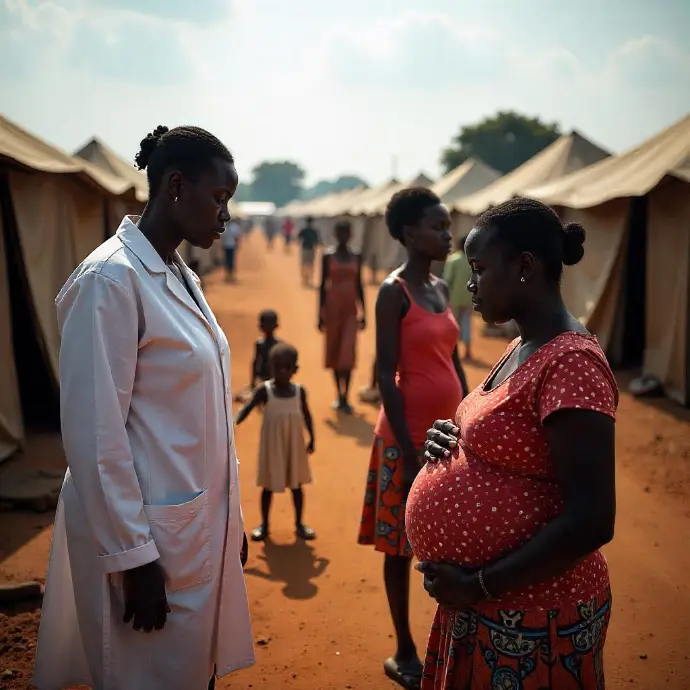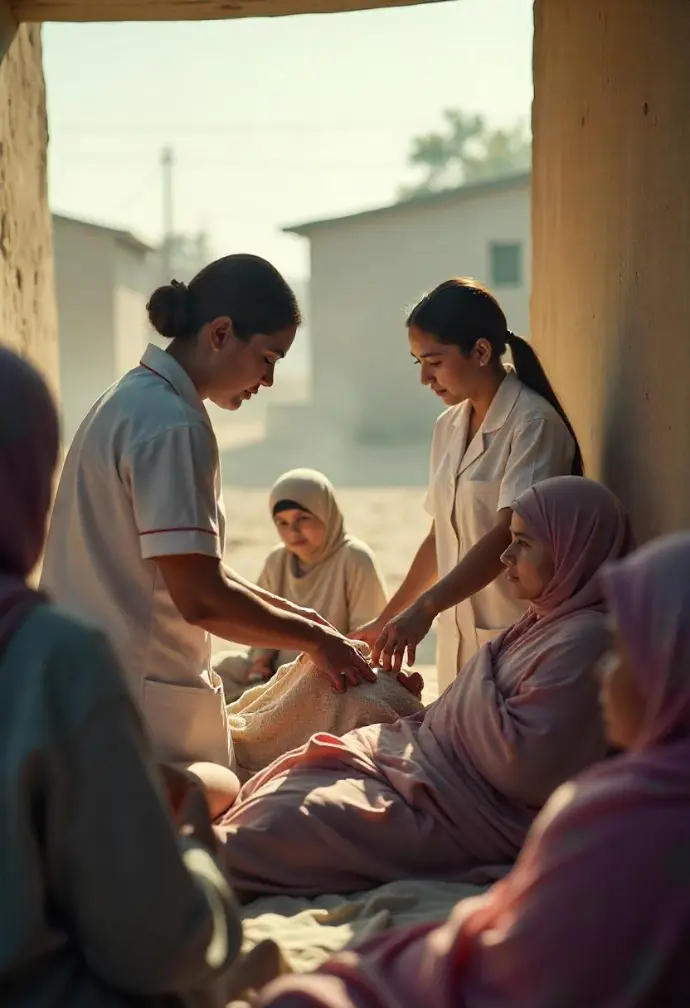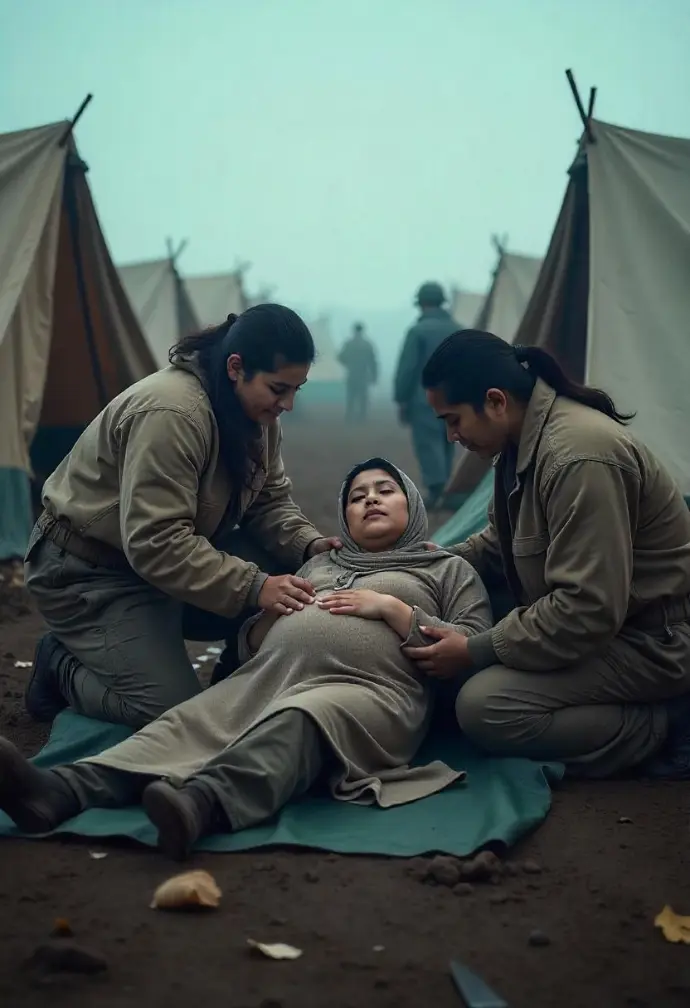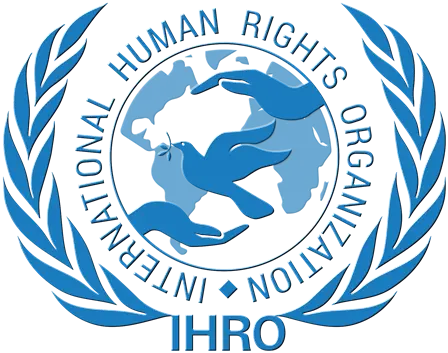



Motherhood on the Battlefield: Access to Reproductive Health in Crisis
Here you will find a space dedicated to the exploration and in-depth analysis of human rights at the global level. In our main article, "Motherhood on the Battlefield: Access to Reproductive Health in Crisis," you will delve into the complex issue of access to reproductive health in crisis situations. Are you ready to delve into this crucial topic and learn more about the challenges women face in these circumstances?

Introduction
Access to reproductive health care in crisis zones is a vitally important issue that requires thorough exploration and in-depth analysis. In the global human rights context, motherhood on the battlefield poses significant challenges, directly impacting the protection of women's fundamental rights in conflict situations. This article examines the impact of the crisis on access to reproductive health care, analyzes the global human rights context in conflict zones, and highlights the importance of this issue in the defense of human rights.
In contexts of armed conflict, women face significant obstacles to accessing health care and reproductive health services. Health infrastructure is often devastated, limiting access to basic services such as prenatal care, safe delivery, and postnatal care. Furthermore, gender-based violence and rape as a weapon of war are widespread practices that increase the risk of unwanted pregnancies, sexually transmitted diseases, and complications during pregnancy and childbirth.
Lack of access to safe contraception and the disruption of family planning services also contribute to an increase in unwanted pregnancies in crisis situations. This reality negatively impacts women's reproductive health, putting their physical and emotional well-being at risk.
Understanding the impact of the crisis on access to reproductive health is critical in order to advocate for effective solutions that protect women's fundamental rights in contexts of armed conflict.
Armed conflicts have a devastating impact on human rights, especially with regard to the protection of life, physical integrity, and health of affected populations. Access to healthcare and reproductive health is severely affected in these circumstances, constituting a clear violation of fundamental rights.
The international community recognizes the importance of protecting human rights in conflict zones and has established standards and protocols to guarantee the protection of the civilian population, including access to reproductive health care. However, the effective implementation of these measures faces numerous challenges, highlighting the need for a comprehensive and coordinated approach to addressing this issue.
It is crucial to analyze the global context of human rights in conflict zones to identify gaps in reproductive health protection and promote strategies that guarantee the fulfillment of these rights in crisis situations.
Defending access to reproductive health care in crisis zones is essential to guaranteeing respect for and protection of human rights in contexts of armed conflict. The vulnerability of women and girls in these circumstances requires special attention and concrete actions that promote their well-being and autonomy.
Advocating for access to health care, family planning, prenatal care, and reproductive health services in crisis situations is essential to preserving the dignity and integrity of affected women. Furthermore, these actions contribute to building more just and equitable societies, in which the fundamental rights of all people are respected, regardless of their context.
The inclusion of reproductive health care in the human rights defense agenda in conflict zones is a crucial step toward the comprehensive protection of the affected population and represents a commitment to promoting equality, justice, and respect for human dignity at all times.
Situation Analysis
In conflict zones, access to reproductive health services is significantly limited due to the disruption of health care systems, the destruction of infrastructure, and a shortage of medical supplies. Pregnant and lactating women face enormous difficulties in receiving prenatal care, safe birth assistance, postnatal care, and family planning. This lack of access endangers the health and lives of women and their children, increasing the risk of complications during pregnancy and childbirth, as well as the spread of sexually transmitted diseases.
The World Health Organization (WHO) estimates that around 60% of maternal deaths occur in conflict settings, highlighting the urgent need to improve access to reproductive health in these areas.
Lack of access to reproductive health care not only has serious implications for women's physical health but also affects their psychological and emotional well-being, as many are forced to face unwanted pregnancies or deal with the aftermath of sexual violence.
Gender-based and sexual violence in conflict zones has a devastating impact on women's reproductive health. The rise of sexual violence and rape as a tactic of war not only causes physical and psychological trauma but also increases the risk of unwanted pregnancies, sexually transmitted diseases, and serious injuries to the reproductive system.
Women who have been victims of sexual violence face additional barriers to accessing reproductive health services, whether due to fear of retaliation, social stigma, or the lack of safe medical facilities. Comprehensive health care, including access to mental health services and psychosocial support, is crucial to address the specific needs of survivors of sexual violence in conflict contexts.
It is critical to recognize that gender-based and sexual violence in conflict zones not only affects women's reproductive health but also represents a serious violation of their human rights, underscoring the need for a comprehensive and urgent response from the international community.
The provision of reproductive health services in conflict zones faces significant challenges, including a lack of trained medical personnel, insecurity that hinders access to health facilities, shortages of essential supplies and medicines, and disruptions to sexual and reproductive education programs.
Furthermore, the stigmatization of certain reproductive health services, such as the distribution of contraceptives or care for victims of sexual violence, can further hinder women's access to the care they need. These challenges require coordinated responses that address not only medical needs but also the socioeconomic and cultural factors that influence access to reproductive health in crisis settings.
Collaboration between humanitarian organizations, national governments, and local actors is crucial to overcoming these challenges and ensuring that women and girls in conflict zones have access to safe, respectful, and quality reproductive health services.
A gender perspective is critical when analyzing access to reproductive health in conflict contexts. Women and girls face unique challenges and often face significant barriers to accessing reproductive health services. In crisis situations, such as armed conflict or natural disasters, women are at greater risk of sexual violence, unwanted pregnancies, unsafe abortions, and complications during childbirth. Therefore, it is crucial to address the specific needs of women and girls when designing and implementing reproductive health programs in conflict zones.
Furthermore, a gender perspective in access to reproductive health must also consider the social, cultural, and religious norms that influence gender roles and decisions related to reproductive health. Gender inequalities and unequal access to reproductive health education and information can be exacerbated in crisis contexts, underscoring the importance of addressing these disparities in a comprehensive and gender-sensitive manner.
To ensure equitable access to reproductive health care in conflict contexts, it is essential to adopt a gender-sensitive approach that recognizes the specific needs of women and girls, promotes gender equality, and addresses the social and cultural barriers that affect their ability to make informed decisions about their reproductive health.
Determining Factors
Access to reproductive health care in conflict zones is hampered by various structural and logistical constraints. Lack of adequate medical infrastructure, shortages of medical supplies, disruption of basic health care services, and widespread insecurity make it difficult for women in these areas to access reproductive health care. Furthermore, the forced displacement of populations can lead to the separation of pregnant women from the prenatal and obstetric care they need, posing a serious threat to their health and that of their babies.
Logistical barriers, such as lack of safe transportation and inaccessibility of health care facilities due to violence, also contribute to limited access to reproductive health care. These combined factors put women in conflict zones at greater risk of complications during pregnancy and childbirth, as well as inability to access contraceptives and family planning services.
In this context, it is critical to address these structural and logistical constraints to ensure that women in conflict zones have access to the necessary health care to protect their reproductive health and that of their families.
The psychosocial impact of armed conflict on the reproductive health of affected communities is significant. The conditions of stress, fear, and trauma associated with violence and forced displacement can have adverse effects on women's mental and emotional health, which in turn influences their reproductive health. Limited access to mental health services and psychosocial support further exacerbates this situation.
Furthermore, rates of gender-based violence tend to increase during armed conflict, exposing women to a greater risk of physical and emotional trauma, as well as unwanted pregnancies as a result of sexual violence. These traumatic experiences have direct consequences for women's reproductive health and require targeted interventions to address their medical, psychological, and social needs.
It is crucial to recognize and address the psychosocial impact of armed conflict on the reproductive health of affected communities and ensure that healthcare and psychosocial support services are available and accessible to those who have suffered the devastating repercussions of violence and displacement.
Humanitarian interventions play a crucial role in access to reproductive health in conflict zones. Humanitarian organizations and aid agencies work to provide reproductive healthcare services, including prenatal care, emergency obstetric care, family planning services, and contraceptive supplies in crisis settings. These interventions save lives and protect the health of women and communities affected by armed conflict.
Furthermore, humanitarian organizations also provide psychosocial support, mental health counseling, and care services to survivors of gender-based violence, recognizing the importance of addressing the psychosocial impact on the reproductive health of affected communities. These interventions not only save lives but also contribute to the recovery and resilience of communities in crisis.
It is essential to highlight the importance of supporting and funding humanitarian interventions for access to reproductive health in conflict zones, recognizing that these actions are critical to protecting the human rights and dignity of populations affected by humanitarian crises.
In conflict zones, access to reproductive health care faces a series of legal and political challenges that limit adequate medical care for pregnant and women of childbearing age. In many cases, restrictive laws, a lack of clear regulations, and political instability hinder the provision of reproductive health services. For example, in certain areas affected by armed conflict, laws may prohibit or limit access to safe abortion services, even in cases of sexual violence. This situation puts the lives and health of women in crisis situations at risk.
Furthermore, political interference often hinders the delivery of necessary medical supplies, the training of qualified health personnel, and the implementation of family planning programs. Lack of funding due to political decisions, corruption, and a lack of priority on the government agenda also contribute to the precariousness of reproductive health services in humanitarian crisis situations. These legal and political challenges create an adverse environment that hinders access to reproductive health care in critical times, putting the lives of women and their children at risk.
It is essential to address these challenges by promoting policies that protect and guarantee access to reproductive health care in crisis contexts. Raising awareness about the importance of these services, strengthening legislation to protect reproductive rights, and applying international pressure to ensure compliance with reproductive health standards are crucial steps to overcome the legal and political obstacles that affect access to reproductive health care in conflict and humanitarian crisis situations.
Actions and Responses
The implementation of reproductive health programs in armed conflict settings is crucial to ensure access to essential services for women and girls in these situations. These programs not only cover medical care during pregnancy and childbirth, but also include the prevention and treatment of sexually transmitted infections, mental and emotional health, and the provision of contraceptives.
These programs must be tailored to the specific circumstances of the conflict, such as limited mobility, lack of medical supplies, and insecurity. It is essential to have trained personnel with experience in crisis settings, as well as adequate resources, to ensure that the reproductive health needs of women and girls are not compromised by the conflict.
Lack of access to reproductive health during conflict situations can have devastating consequences, including increased maternal mortality, unintended pregnancies, and an increased risk of sexual and reproductive health-related diseases and complications. Therefore, the effective implementation of reproductive health programs in armed conflict settings is an essential part of the humanitarian response.
Effective coordination between humanitarian organizations and local actors is critical to ensuring access to reproductive health care in crisis settings. During conflict situations, collaboration between different entities, such as NGOs, UN agencies, local governments, and community-based organizations, is essential to identify priority needs and coordinate the efficient delivery of reproductive health services.
Collaboration with local actors is especially important, as they have in-depth knowledge of the situation on the ground, including the cultural and logistical barriers that may affect access to reproductive health care. By working together, humanitarian organizations and local actors can tailor responses to specific community needs, ensuring that reproductive health services are culturally sensitive and accessible to all people affected by the conflict.
Coordination also helps avoid duplication of efforts and optimize the use of available resources, which is critical in crisis settings where supplies and medical personnel may be limited. Likewise, effective coordination contributes to a comprehensive approach that addresses not only medical care but also psychosocial aspects and reproductive health information.
Community empowerment plays a key role in accessing reproductive health in conflict settings. By empowering communities to be advocates for their own reproductive health needs, active participation in decision-making regarding available services and resources is promoted. This participatory approach not only strengthens communities' capacity to advocate for their rights but also fosters the long-term sustainability of interventions.
Community empowerment can be achieved through reproductive health education, training local leaders, creating support networks, and promoting gender equity. By involving communities in the planning, implementation, and monitoring of reproductive health programs, interventions are ensured to be culturally appropriate and respond to the real needs of people affected by conflict.
Furthermore, community empowerment helps break down cultural and social barriers that can hinder access to reproductive health, such as the stigma associated with certain services or practices. By promoting knowledge and self-determination in reproductive health issues, the foundation is laid for positive and sustainable transformation in conflict-affected communities.
Conclusions
Guaranteeing access to reproductive health care in crisis contexts remains a global challenge. Women living in conflict zones face significant obstacles to obtaining adequate health care during pregnancy, childbirth, and the postpartum period. The lack of safe medical facilities, shortages of supplies and trained personnel, and widespread violence contribute to the difficult situation women face in these circumstances.
It is essential to recognize the importance of collective action in defending human rights in conflict zones. International organizations, governments, NGOs, and civil society play a crucial role in protecting women's reproductive rights in crisis situations. Pressure and collaborative work from multiple actors are essential to promote significant changes in ensuring access to reproductive health care in these challenging circumstances.
The need for comprehensive solutions to address access to reproductive health care in crisis contexts is undeniable. A combination of strategies is required that addresses both immediate needs, such as the provision of health care and supplies, and the underlying causes of lack of access to reproductive health in conflict zones. This includes measures to address gender-based violence, forced displacement, food insecurity, and the lack of medical infrastructure, among other factors.

 IHRO NEWS
IHRO NEWS